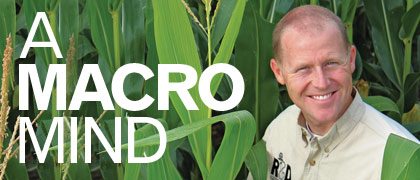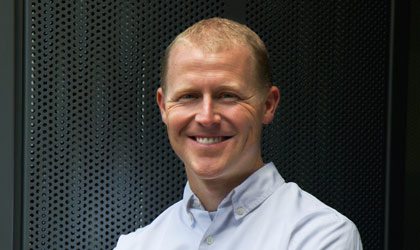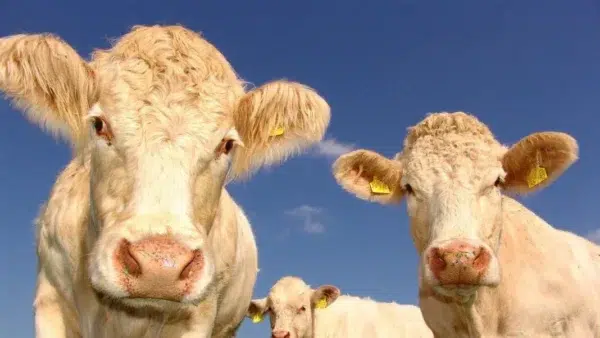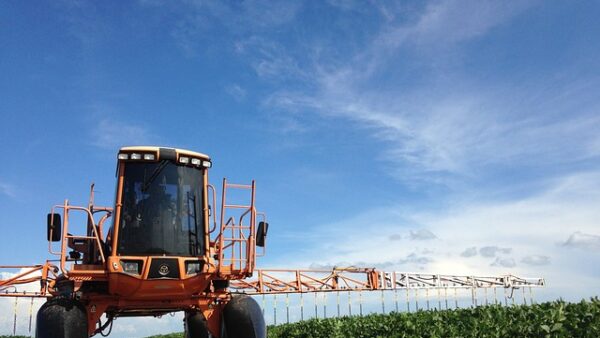Seed World sits down with the 2014 Future Giant of the Seed Industry award winner and explores the realities that keep Chris Boomsma motivated.
Far from his urban roots, on the south side of Chicago, Chris Boomsma is making a name for himself within the seed industry.
On any given day, he can be found in meetings, doing field work, interacting with universities and other companies, talking to classrooms, phenotyping corn plants or exploring the latest in precision ag technology.
When Boomsma started taking plant science classes at Dordt College in Iowa, his mom asked him what he was going to do with a degree in agriculture. The collegiate scholar jokingly replied “I’m going to be the secretary of agriculture.” That was in 2000. While he’s not the secretary, Boomsma is an avid advocate for agriculture and the seed industry.
That’s one of the many reasons why Boomsma, who works for Dow AgroSciences, was chosen by Seed World as the 2014 Future Giant of the Seed Industry. The award, which is co-sponsored by the American Seed Trade Association’s Future Seed Executives, a sub-committee of the Management Skills Committee, was presented in June at ASTA’s 131st Annual Convention in Indianapolis, Indiana.
Seeded In Science
From a young age, Boomsma was attracted to the sciences. “I really loved biology and chemistry,” he says. And the more time Boomsma spent with his father and grandfather talking about farming, the more he realized agriculture was a logical fit.
“During my undergraduate studies, I liked how plant physiology connected many areas together — soil, chemistry and genetics,” says Boomsma, who went straight from his undergraduate work to a doctoral program in Purdue University’s Department of Agronomy. It was here that Boomsma studied how corn plants compete with each other.
His advisor and mentor, Tony Vyn, says that he still keeps in contact with Boomsma through the classroom and his own research projects. “Chris recently lectured in my graduate class at Purdue, and we’ll definitely want him back,” Vyn says. “He is well spoken, but more importantly, he is a solid critical thinker about the underlying physiological factors that matter most in crop stress tolerance.”
“Agriculture is high-tech … Within research and development, we often leverage the same technologies that pharmaceutical companies and those within the defense industry do.” — Chris Boomsma
In addition to interacting with graduate students, he also gives Extension presentations to farmers and research presentations at conferences. “I enjoy helping other people learn,” Boomsma says. “If there’s an opportunity for me to educate people disconnected from agriculture about what it takes to grow a sustainable crop, I really like that.”
Boomsma believes that his urban upbringing is beneficial when it comes to connecting with others about food and agriculture.
“I hear a lot of conversations about food and I respect their passion and concern,” he says. “I just wish they understood the science a little better. There is a misperception that farming and agriculture don’t require an education, are environmentally destructive and are low-tech. It’s quite the opposite. Agriculture is high-tech, often requires higher education and employs a wide array of skills and knowledge. Within research and development, we often leverage the same technologies that pharmaceutical companies and those within the defense industry do.”
According to a study by the National Institute of Food and Agriculture and the Department of Agriculture, “The agricultural, food and renewable natural resources sectors of the U.S. economy will generate an estimated 54,400 annual openings for individuals with baccalaureate or higher degrees in food, renewable energy and environmental specialties between 2010 and 2015 … A shortfall of new graduates with preparation in priority business and science specialties is forecast in the latter half of the period.”
“This is an area that has jobs and needs employees because people obviously need to eat,” says Boomsma, who sees the bigger picture and understands how he fits into it. “The demand for agriculture is naturally unrelenting.”
After earning his doctorate, Boomsma went to work for Dow AgroSciences in 2009 as a crop physiologist and agronomist. During the past five years, he’s transitioned into the area of adaptation development leader and currently serves as agronomic traits product characterization leader where he works with a team at Dow in the rapidly advancing area of crop phenotyping.
Balancing Act
Today, Boomsma and his wife, Kelly, have two young children. Boomsma enjoys balancing it all but when he feels productivity starting to slip, he hits the gym for a quick workout. Boomsma has his mind focused on two primary areas, agronomic traits and precision agriculture.
Specifically, he’s working on nitrogen use efficiency and drought tolerance in corn. “These aren’t areas we’ll solve overnight,” Boomsma notes. “There’s room for continual improvement. It requires excellent science, great teamwork and a really in-depth understanding of plant genetics, physiology and agronomy.”
Additionally, these problems can’t be solved alone, and Boomsma enjoys working on these macro challenges, which bring university and business people together from diverse fields. “Chris has been instrumental in reaching out across a large company to pull experts together to collaborate and solve common research problems,” says James Parks, who was Boomsma’s direct supervisor from 2009 to 2013. “He’s a consistent generator of new ideas that are well thought-out and highly respected by his peers.”
Precision agriculture is just as exciting to Boomsma because it’s taking agronomy to a new level. “It’s very site-specific and farm-specific,” he explains. “We’re bringing areas together that will likely change how we do things.”
It’s probably no surprise that Boomsma is a planner. He likes things planned out — short-, medium- and long-term — with a clear road map for getting there.
While reading and learning might not be a priority for some, it’s an obsession for this scientist. He wakes up at 5:30 a.m. and reads before the day gets hijacked by meetings, phone calls, field visits and email. Boomsma takes in as much information as possible from a wide range of sources — scientific literature, press releases, patents and magazines. “I read what competitors are doing, what giants in the industry are doing and also study what they’ve done,” Boomsma says.
It’s this appreciation and dedication to science and learning that has allowed Boomsma to step in and step up in such a competitive industry.
Some of Boomsma’s go-to sources of information include Journal of Science, Field Crops Research, Crops Science, WIRED and Successful Farming
Solutions Through Service
“What excites me about working in the seed industry is the ability to employ my passion for research and skills in science to address humanity’s core need for affordable, sustainably-grown food,” Boomsma says. “It’s very rewarding to work in an industry that has a direct impact on the quality of life of so many individuals.
“With the opportunity to address this need comes the responsibility to deliver sustainable solutions. I hope my work has a positive impact on the lives of others through the solutions I help develop at Dow AgroSciences and through my larger involvement within the seed industry.”
Involved in the American Society of Agronomy and ASTA, Boomsma understands the importance of working collectively with others to help benefit agriculture as a whole.
“I was always taught by my parents and teachers to understand how you fit into the larger picture,” says Boomsma, noting that the service opportunity is the No. 1 thing that drew him to agriculture. “Indirectly, we are helping to feed the world.”
For Boomsma, having a positive impact is important. “If you don’t, then who will?” he asks. “What or who will fill that void? I’ve always had a conviction that with hard work, dedication and fortitude, we can achieve so much in this world. If you employ the talents you’ve been given, great things can happen.”
Who knows — maybe secretary of agriculture isn’t out of the question for this young seedsman.
Julie Deering
Student AdviceWhen talking with students, Boomsma tells them that they have to choose a career path they are passionate about. “There needs to be opportunities for growth, both professionally and personally,” he says. “When choosing an employer, you have to study not only the position, but also your potential colleagues and employer and the overall work they are doing. Really look into the culture of the group that you’re considering either joining or doing business with. If it compromises who you are or what you believe, it’s not worth it.” |
















